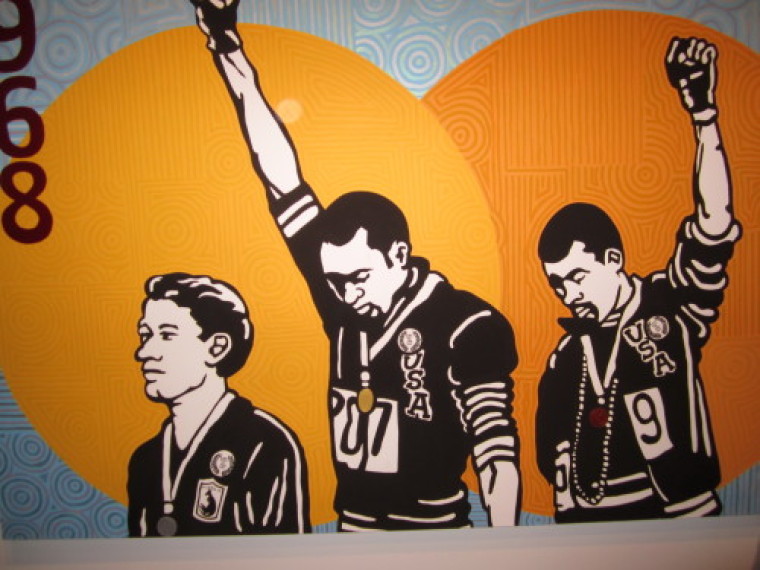
It depicts Tommy Smith the 1968 Mexico Olympic Champion in the 200 metre sprint along with Bronze winner John Carlos having been presented their medals, placed on black gloves and during the USA's Anthem recital, raised their arms above their heads.
Silver medallist, Australia's Peter Norman became a great supporter of their cause where Black America in many parts of the country remained second class citizens.
Donna Leslie who wrote the review for the Basil Sellers Art Prize handbook wrote in part: "Richard Bell is a creative provocateur who arouses audience sensibilities and consciousness by acknowledging human histories that are pivotal to the development of human rights."
Peter Norman in 1968 when on the podium wore on his tunic track suit an Olympic Project for Human Rights badge communicating his support for their ideals, which clearly reveals that he was in on the political protest.
Afterwards, in Australia, Peter Norman was ostracised and although he qualified for the 1972 Munich Olympic Games, he was not selected. Meanwhile, in America the Olympic Committee stripped both Smith and Carlos of their Medals and the media negativity was sensational. It had a greater impact than their podium actions.
That same year Martin Luther King jnr and Robert Kennedy were assassinated. The civil rights movement was in full anthem. Today there is a black US President.
Long forgotten are the names of those Olympic officials whereas Tommy Smith and John Carlos became international heroes. It came from an era where Cassius Clay who won Gold in the light heavyweight division at the Rome Olympics eight years earlier in 1960, who threw his Gold medal into the Ohio River where it remains to this day when he discovered that all his fame and success couldn't buy him a burger in his own home town of Louisville. He was told by the storekeeper, "we don't serve niggers here".
Celebrated today by Aboriginal Australia
Peter Norman is celebrated by Aboriginal Australia because he was one of the rare individuals who offered his support for black rights at a time when civil rights violations in the US had led to wide spread protests.
Today, those 1972 Australian Track and Field Olympic selectors might well have been in breach of Australian industrial law (as in the cricketers legal victories). He was not even invited to the Sydney 2000 Olympics but the Americans ensured he was their guest. When Peter Norman died (3 October 2006 aged 64), those of his era, mourned. (en.wikipedia.org)
In 1968 as a 17 year old I was getting into stride toward my top level Track and Field and Hockey years. This event is as clear in my mind today as it was then and it provided a sense of meaningful direction to be part of the solution in injustices. My wife Delma of 35 years says she was 15 years of age and she too remembers it. Undoubtedly, a defining moment in modern history with ramifications far beyond sport.
Dr Mark Tronson is a Baptist minister (retired) who served as the Australian cricket team chaplain for 17 years (2000 ret) and established Life After Cricket in 2001. He was recognised by the Olympic Ministry Medal in 2009 presented by Carl Lewis Olympian of the Century. He has written 24 books, and enjoys writing. He is married to Delma, with four adult children and grand-children.
Mark Tronson's archive of articles can be viewed at www.pressserviceinternational.org/mark-tronson.html